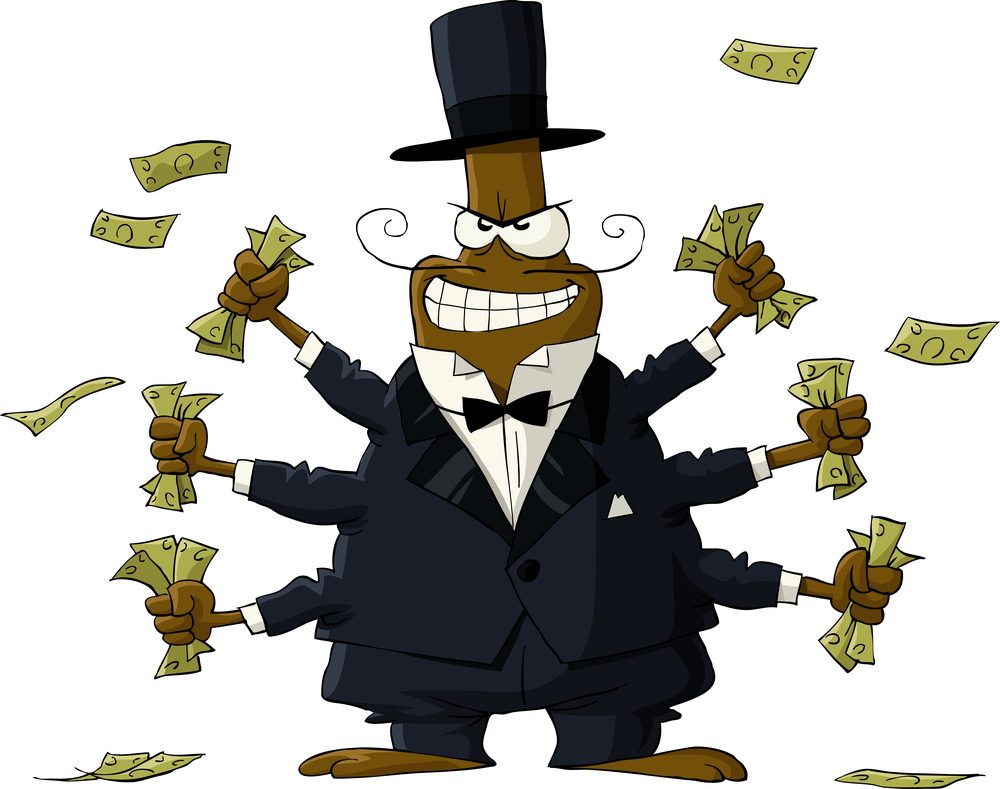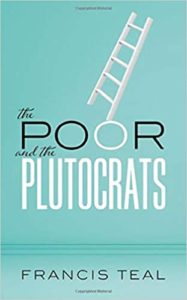Is Inequality a Problem?
By Nils Karlson


- Book Review of The Poor and the Plutocrats: From the Poorest of the Poor to the Richest of the Rich (Oxford University Press 2021) by Francis Teal.1
In a recent book, The Poor and the Plutocrats, (Oxford University Press 2021), Francis Teal, a research associate at the University of Oxford, tries to sort out some of these issues. The title of the book itself gives a good hunch about his leanings, but it is an ambitious attempt to summarize some of the relevant statistics and earlier research about the topic. This makes the book well worth reading, even though much more remains to be said on the topic, both empirically and normatively.
To begin, it is today a well-established fact, confirmed by Teal’s analysis, that income inequality between or across countries, measured by differences in GDP per capita, has decreased dramatically in the last decades, a unique development at least over the last 300 years for which we have some data. Literally billions of people in some developing countries have been lifted out of poverty and starvation due to globalization and more open economies. As a result, the absolute number of poor persons has decreased in the world. In fact, among the relatively poor global incomes are rising faster than the average of the top 20 percent of the world’s income. China is of course the most important example, but other Asian Tigers, notably constitutional democracies like South Korea and Taiwan, are in many regards even more impressive, while many nations in Africa and South America are lagging.
The explanation for this extraordinary development is precisely globalization in terms of a freer flow of ideas, goods, services, capital, and people across countries, and the opening of markets through more secure property rights, freedom of enterprise and the rule of law within these developing countries, i.e., very close to what most of us would call “capitalism”. Teal, however, does not have a good grasp either of the market economy or its institutional underpinnings. This is a major weakness of the book that I shall return to below.
Equally well established is the fact that income inequality within many developed countries has increased over the last decades, whether we measure it in terms of Gini-coefficients, Lorenz curves, or different ratios of the top incomes to the bottom incomes. Especially, the share of incomes of the top 1 percent or even top 0.1 percent have increased dramatically. For example, in 2015 CEOs in the top 350 American firms made 286 times the salary of a typical worker, while in 1978 CEO earnings were roughly 30 times the typical worker’s salary. Teal also claims, even though he admits that data is shaky, that in 2014 the average income of the super rich, the 0.1 percent, in the United States was 3.6 million USD, while within that top 0.1 percent some 100 individuals had incomes that exceed 100 million USD.
It is those 0.1 percent that Teal, without giving a strict definition, calls “plutocrats”. At the other end of the scale, the poor, the incomes of the relatively unskilled have stagnated or even fallen in parts of the developed world, and especially in the United States where wages of the lower middle class have been stagnant over the last decades. To describe and explain these developments is the major focus of Teal’s book, especially by comparing the United States with the United Kingdom.
In the past, Teal argues, there was a strong connection between the development of the growth of workers’ earnings and labour productivity, but this does not seem to be the case anymore. Moreover, even though Chinese imports and offshoring may have contributed to a fall in well-paid jobs in manufacturing, the real cause is, he argues citing other research, changes in technology that have caused a sectoral shift to services where the wages are lower. This sounds familiar to the experience in Germany and other European countries.
When it comes to the top earners, Teal notices that one the most striking aspects of the rise of the incomes have been the importance of labor incomes in their total incomes. For both the top 1 percent and the top 0.1 percent in the United States, their labor income grew faster than their income from capital in the period from 1962 to 2000. He also quotes Xavier Gabaix and Augustin Landier (2008) who have shown that the increase of CEO pay between 1980 and 2003 can be fully attributed to the six-fold increase in market capitalization of large American companies during that period. So much for the view that ‘capitalists’ do not work.
In a rather confusing section Teal tries to analyse the sources of the wealth of British and American billionaires by distinguishing between different categories that he thinks correspond to ‘merit’ and ‘rent-seeking’ respectively. To the former category belongs ‘founders non-finance, exemplified by Bill Gates, and to the latter ‘self-made finance’, exemplified by Warren Buffet or bankers more generally, and ‘inherited’ exemplified by the Duke of Westminster. His rather vague conclusion is that, yes, the wealth of some billionaires in fact comes from the merits of founding and developing successful companies, but almost as important are ‘rents’ from financial markets or inherited land and the like. The latter two he implies arise because our societies and markets are dysfunctional or ‘crony’.
So where does this all take us? Is inequality a problem or not? I am afraid Francis Teal’s book does not give us much help in answering these questions, despite its empirical ambitions. One of the reasons is that he uses the term plutocrat, without giving a strict definition, to describe those in our societies that earn a lot of money or are very wealthy. A ‘plutocrat’ In standard vocabulary and in most common dictionaries is a person whose political power derives from their wealth. According to Collins English Dictionary, “If you describe someone as a plutocrat, you disapprove of them because you believe they are powerful only because they are rich”. But there is nothing in Teal’s book that shows that the rich he describes, individually or as a group, have political power or can influence politics or society in any illegitimate way.
This brings me back to Teal’s lack of understanding of the market economy and the importance of its institutional underpinnings. For markets to work, there must be secure property rights, freedom of enterprise, and the rule of law. This is a prerequisite for growth, innovations, and entrepreneurship, as shown by F. A. Hayek (1973) and many others.
Given that these kinds of institutions are in place, which surely still is a matter of degree in many developing countries, the distribution of incomes and wealth that result can in themselves be regarded as ‘fair’. Not because they all can be attributed to merit, as Teal seems to think, but because they have come about within an institutional framework that most of us consider to be just. An entrepreneur, a founder, a CEO, or an owner of land are only successful as long as he or she satisfies the voluntary demand of buyers and consumers. Luck, timing, first-mover advantage and other circumstances that may not easily be attributed to ‘merit’ or hard work may contribute to such entrepreneurial profits and success in markets. In a digitalized and globalized economy, with network effects and huge scale economies, huge fortunes may be created through these market processes, an outcome we may label ‘fair inequality’.
However, if the institutions are corrupt and the markets are ‘crony’ because the lack of rule of law, restrictions on the freedom of enterprise, or insecure property rights, then the outcome of the market process can surely be regarded as unfair and the incomes and wealth of plutocrats be a serious problem. Such inequalities should certainly be considered unfair. But to show this requires another type of analysis than Teal’s.
The same is true for financial markets. It is nothing unfair to make money by handling risk, facilitating the financing of enterprises, helping savers to invest, and borrowing to buy a house, as long as the rules are not manipulated. On the contrary, the functions are an integrated part of the market economy. If someone is to blame for the huge incomes made in financial assets and stocks in the last decades, it is the governments and central banks that have used credit expansion and financial easing as the major dominant method to handle everything from business cycles to financial crashes.
But could not inequality still be a problem, even if the institutions of markets are fair? Apparently, many people still think so, even if they themselves freely buy the products and services that have made some people super rich. And is it not a problem that the wages of even middle-class groups have stagnated in countries like the United States?
I think so. Liberal democracy, the free society, and the market economy itself rest on institutions that cannot be supported if social divisions become too wide. Everyone, or at least a large majority, must be convinced that they have a ‘stake in the system’, that they also have a chance at a better life. Perhaps it is here those of us who still think inequality is a problem should put our emphasis in the promotion of an inclusive society: on social mobility, on improving the educational system, on easing the burden of financing university studies, and so on? Such an emphasis on a basic equality of opportunity, or ‘free-market fairness’ as John Tomasi (2012) puts it, would be a more constructive way forward than to criticize inequality itself. In a free society ‘fair inequality’ should be part of the game.
References
Gabaix, X. and Landier, A. (2008). Why has CEO Pay Increased so Much? The Quarterly Journal of Economics, 123(1): 49-100
Hayek, F. (1973). Law, Legislation and Liberty, Vol 1: The Rules and Order. London & Henley: Routledge & Kegan Paul.
OECD (2015). https://www.oecd.org/social/inequality.htm
Piketty, T. (2014). Capital in the Twenty-First Century. Cambridge, MA: Harvard University Press.
Rodrik, D. (2021). “Why Does Globalization Fuel Populism? Economics, Culture, and the Rise of Right-Wing Populism.” Annual Review of Economics, Vol. 13.
Stiglitz, J. (2015). The Great Divide. Random House, UK: Penguin Books.
Teal, F. (2021). The Poor and the Plutocrats. From the Poor of the Poor to the Richest of the Rich. Oxford: Oxford University Press.
Tomasi, J. (2012). Free Market Fairness. Princeton University Press.
UN (2021). Goal 10—Why Addressing Inequality Matters. https://www.un.org/en/chronicle/article/goal-10-why-addressing-inequality-matters
Footnotes
[1] The Poor and the Plutocrats: From the Poorest of the Poor to the Richest of the Rich, by Francis Teal. Oxford University Press 2021.
* Nils Karlson is Professor of Political Science and President of the Ratio Institute, Stockholm, Sweden.
